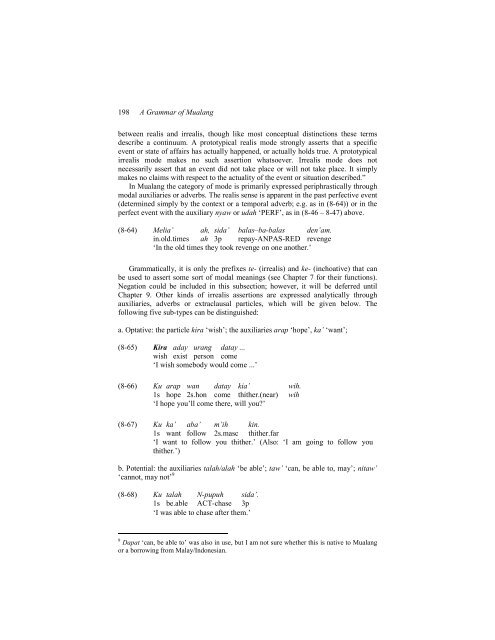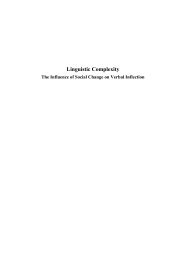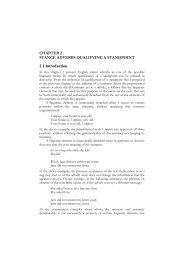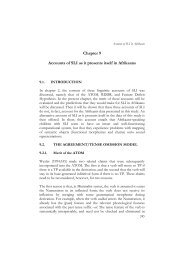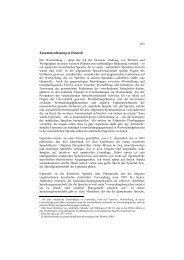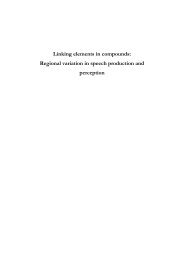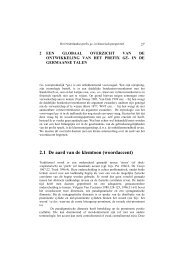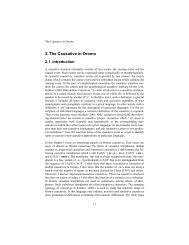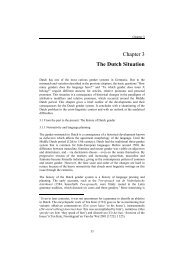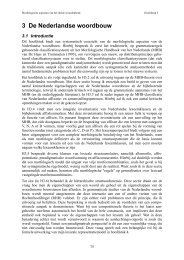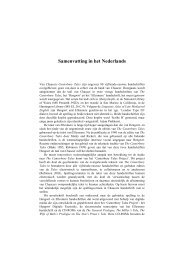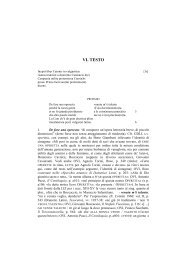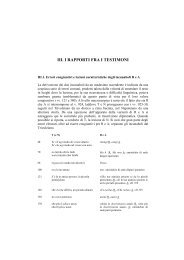Chapter 8: Other Verb-Phrase Operations - LOT publications
Chapter 8: Other Verb-Phrase Operations - LOT publications
Chapter 8: Other Verb-Phrase Operations - LOT publications
Create successful ePaper yourself
Turn your PDF publications into a flip-book with our unique Google optimized e-Paper software.
198 A Grammar of Mualang<br />
between realis and irrealis, though like most conceptual distinctions these terms<br />
describe a continuum. A prototypical realis mode strongly asserts that a specific<br />
event or state of affairs has actually happened, or actually holds true. A prototypical<br />
irrealis mode makes no such assertion whatsoever. Irrealis mode does not<br />
necessarily assert that an event did not take place or will not take place. It simply<br />
makes no claims with respect to the actuality of the event or situation described.”<br />
In Mualang the category of mode is primarily expressed periphrastically through<br />
modal auxiliaries or adverbs. The realis sense is apparent in the past perfective event<br />
(determined simply by the context or a temporal adverb; e.g. as in (8-64)) or in the<br />
perfect event with the auxiliary nyaw or udah ‘PERF’, as in (8-46 – 8-47) above.<br />
(8-64) Melia’ ah, sida’ balas–ba-balas den’am.<br />
in.old.times ah 3p repay-ANPAS-RED revenge<br />
‘In the old times they took revenge on one another.’<br />
Grammatically, it is only the prefixes te- (irrealis) and ke- (inchoative) that can<br />
be used to assert some sort of modal meanings (see <strong>Chapter</strong> 7 for their functions).<br />
Negation could be included in this subsection; however, it will be deferred until<br />
<strong>Chapter</strong> 9. <strong>Other</strong> kinds of irrealis assertions are expressed analytically through<br />
auxiliaries, adverbs or extraclausal particles, which will be given below. The<br />
following five sub-types can be distinguished:<br />
a. Optative: the particle kira ‘wish’; the auxiliaries arap ‘hope’, ka’ ‘want’;<br />
(8-65) Kira aday urang datay ...<br />
wish exist person come<br />
‘I wish somebody would come ...’<br />
(8-66) Ku arap wan datay kia’ wih.<br />
1s hope 2s.hon come thither.(near) wih<br />
‘I hope you’ll come there, will you?’<br />
(8-67) Ku ka’ aba’ m’ih kin.<br />
1s want follow 2s.masc thither.far<br />
‘I want to follow you thither.’ (Also: ‘I am going to follow you<br />
thither.’)<br />
b. Potential: the auxiliaries talah/alah ‘be able’; taw’ ‘can, be able to, may’; nitaw’<br />
‘cannot, may not’ 9<br />
(8-68) Ku talah N-pupuh sida’.<br />
1s be.able ACT-chase 3p<br />
‘I was able to chase after them.’<br />
9 Dapat ‘can, be able to’ was also in use, but I am not sure whether this is native to Mualang<br />
or a borrowing from Malay/Indonesian.


